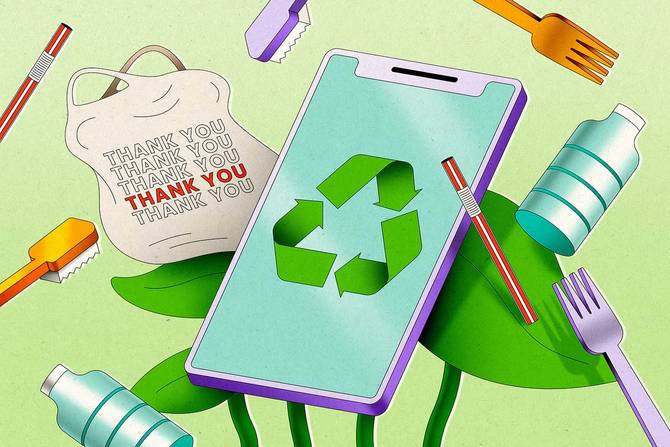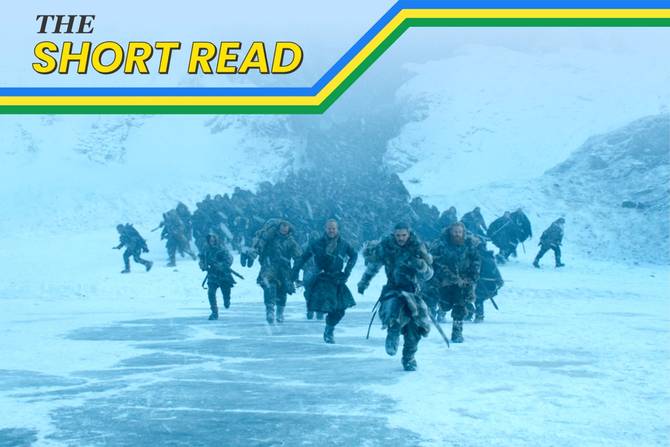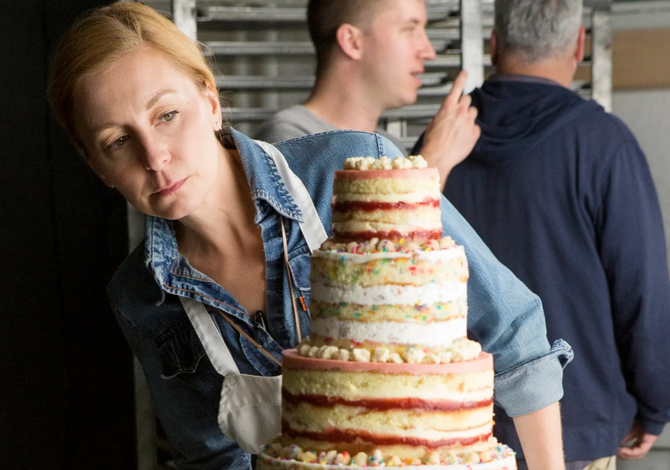| | | | | |  Francis Scialabba | | IN THIS ISSUE | Influencers resist the doom of climate change | Christina Tosi shakes it off | Crypto gets chilly | | | | Welcome to the first edition of Brew Review, our new Sunday newsletter. ICYMI, Morning Brew has been doing original longform stories for the last few months and that work will form the core of the Brew Review. But it's not all serious—hopefully, we'll retain the humor and warmth that Neal, Matty, Jamie, and Max produce Monday through Saturday. We've added "This or That?" It's where we ask some of our favorite people to pick a side on contentious debates like, "Hot Coffee or Iced Coffee?" (It might get ugly.) We're also launching Questionnaire, where people we respect and admire indulge us by answering our silly questions. We're absolutely thrilled that Milk Bar's Christina Tosi was the first to fill out Brew's Questionnaire. And don't worry, we've still got you covered on the news front: Every week we'll be breaking down a major news story. First up, we'll explain whether or not crypto winter is coming. Hopefully it's a bit more coherent than the last season of Game of Thrones. (C'mon, they did Dany dirty.) We hope you enjoy reading it as much as we enjoyed making it.
—Stassa Edwards, Amanda Hoover, Ashwin Rodrigues, Sherry Qin
| | | | | | | Kennedy Hammond is giving a tour of her "zero waste bathroom." She shows off tablets of toothpaste stored in a small jar, a bamboo toothbrush, an even smaller refillable bottle of locally made face serum, and bamboo-sourced toilet paper. There isn't a single plastic bottle in sight. Instead, shampoo and conditioner have been pressed into neat bars and rest on a wood plank in her shower. "I never put liners in my trash can," Hammond says, "because there's nothing ever in there." Hammond's tour is on TikTok, where she shares her zero waste lifestyle with her 256,000 followers. The 24 year old from Visalia, California, says being zero waste means a home is at least 90% free from trash, like the kind of single-use plastic containers that shampoo is normally sold in. But her lifestyle goes beyond reusables in the bathroom. She doesn't waste food and she composts her scraps; she also upcycles as much as she can (spaghetti sauce jars become drinking cups). The garbage typically produced in kitchens, bathrooms, and laundry rooms doesn't exist in Hammond's house, and that's by design. "People who aren't familiar with something are going to obviously say it's hard," Hammond said, referring to the labor and commitment zero waste living requires. "Everybody can be zero waste. It's whether or not you try or you want to try." Zero waste influencers like Hammond are growing in number on TikTok and Instagram. Their aesthetic is ubiquitous—part minimalism, part DIY—and their tone is stunningly positive for a topic as dire as the apocalyptic climate crisis. The zero waste influencers' sunny attitude and clean minimalism make the lifestyle more desirable to their followers. It contrasts starkly with the realities of climate change, particularly as headlines warn of the impending doom of global warming. These influencers offer a solution to climate anxiety; namely, a sense of control while living on a planet that increasingly feels like it's teetering on the brink of disaster. That can feel positive and powerful in contrast to the grim reality of climate change. One hundred companies, including top offenders ExxonMobil, Shell, BP, and Chevron, have created more than 70% of the planet's greenhouse gas emissions: Individuals can do very little to stop that mass pollution, but something like an empty wastebasket can feel like a tangible solution. The women who spoke to Morning Brew about their zero waste lifestyles—and the influencers are overwhelmingly women—described feeling an awakening to the waste around them, seeing clearly the plastic film on packaged food or wrapped around produce. They reject the Amazonification of the world, where everything ships quickly in disposable plastic and cardboard, in favor of a mindful lifestyle. They might make some household supplies, but they also shop in specialized marketplaces for solutions to help protect the planet, like leggings made from recycled water bottles and bamboo utensils. Building a lifestyle around shunning waste is laborious, but it's work that helps them to feel empowered, even if they're merely individuals trying to keep systemic catastrophe at bay. Read more about zero wasters and everything they're doing to shrink their footprint. | | | | | | Nobody has the perfect diet—there are just too many gaps to fill, no matter how well you eat. Drinking AG1 by Athletic Greens is the fastest—and easiest—way to give your body the high-quality nutrition it needs. AG1 packs 9 products into one delicious scoop that you can mix and sip in just 60 seconds. Foundational nutrition? You just found it. AG1 is full of 75 other vitamins, minerals, probiotics, prebiotics, superfoods, and more—all the good stuff you need for a healthy routine to support gut health, immunity, energy, mental clarity, and more. Hundreds of thousands of people already use AG1 daily to take ownership of their health. Get your health back in your hands with AG1 today and enjoy a free welcome kit, a year's supply of Vitamin D, a flexible delivery schedule, and even a 60-day money-back guarantee. | | | |  Game of Thrones/HBO Game of Thrones/HBOThis isn't a Game of Thrones thing. This is about a different alternate reality that quickly became a lucrative franchise: the crypto world. "Crypto winter" refers to an extended period of downtrending crypto prices, or when you see a bunch of guys in Hawaiian shirts in Miami who look sad, kind of like they just lost a ton of money. But has crypto winter actually come? Bitcoin is down more than half of its value from an all-time high of over $68,000, ethereum is down even further, and the overall crash accounts for about $1 trillion of lost value. Zooming out to the global view, the World Bank warned that most countries are on the path toward a recession. Whether crypto winter is coming or not, there are some concerning indications from crypto VCs, crypto companies, and regulators that factor into the unseasonable forecast. Citing recession fears, tech companies—including major players in crypto—have announced record layoffs. Gemini plans to lop off roughly 10% of its workers and Coinbase extended its hiring freeze and rescinded job offers, including some that had already been accepted. Crypto companies across the world are trimming their workforces, not only in anticipation of recession but also possibly due to less crypto trading volume. Andreessen Horowitz's inaugural State of Crypto report warned that the industry may be headed toward winter, given the "recent market downturn." Around the same time, the firm announced a massive $4.5 billion fund that could take advantage of discounted pricing, kind of like buying board shorts at TJ Maxx in December, assuming that summer will come. The crypto winter was preceded by the crash of the algorithmic stablecoin terra and its partner token, luna. The stablecoin was promised to be a "safe and happy" way to make a 20% yield (the SEC is looking into this claim), as long as the coin stayed pegged to the dollar. But it didn't and in May it crashed, wiping out about $40 billion of value from the crypto market. The steadfast Do Kwon, co-founder and CEO of Terraform Labs, the company behind terra, wasn't deterred. At the end of May, Kwon launched Luna 2.0, and that one crashed by more than 70% in its first week. American regulators found the luna-cy (sorry) somewhat interesting, and began asking themselves how stablecoins should be regulated. On June 7, the Senate introduced the Responsible Financial Innovation Act, a highly anticipated bill meant to create a regulatory framework for digital assets. Introduced by Democrat Kirsten Gillibrand and Republican Cynthia Lummis—two senators who recently suggested that workers look to bitcoin as a retirement savings vehicle—the bill is seen as "pro-cryptocurrency," since it classifies most digital assets as commodities instead of securities. This distinction puts the majority of crypto under the purview of the Commodity Futures Trading Commission (CFTC) instead of the SEC. Compared to the SEC, the CFTC has a smaller budget, with $365 million proposed vs. $2.15 billion proposed for FY2023. Though the bill is seen as favorable for the crypto industry, it introduces more oversight to stablecoins and altcoins, suggesting a more permanent winter for something like the Let's Go Brandon coin, currently trading at $0. The crypto market isn't old enough to buy a beer, so there isn't a lot of historical data to extrapolate from. Whether we're in the middle of a crypto winter or not, it's definitely feeling a little chilly. | | |   K C Bailey/Netflix K C Bailey/NetflixChristina Tosi, founder of Milk Bar and host of Bake Squad, is known for her unexpectedly delicious recipes, like her famous cereal milk soft serve. She's built her bakery empire over the past decade, earning a few James Beard Awards in the process. In her new book, Dessert Can Save the World: Stories, Secrets, and Recipes for a Stubbornly Joyful Existence, she shares both recipes and personal stories about baking's ability to create connection and harness love. What's the best advice you ever received? Less advice, more of a reminder my mom sent in a care package last week that I keep going back to: Chasing your dreams is not for the faint of heart. Other Greta (mom) advice classics include "don't let the ankle biters get you down" and "if you're smiling bright enough, no one will notice the size of your feet." (We have awkwardly large feet and are self-conscious about it!) What's the most embarrassing song you'll publicly admit to liking? "Shake it Off." Love T. Swift. Love the song. Resistance is futile. We all need a dance break, especially one to shake the stuff off. What fictional person do you wish were real? Ted Lasso. Optimism is the coolest thing; we need more real life human examples of it. What real person do you wish were fictional? All the meanies out there. How would you explain TikTok to your great-grandparents? Oh. Wow. I'm not sure I even know how to explain TikTok for myself other than it's where I go when I want to feel old in theory but young at heart when watching tandem dances and laughing in awe. What always makes you laugh? Watching Butter (the dog) buck like a bronco after I give her a bath. If you were given a billboard in Times Square, what would you put on it? SHOW UP AND MEAN IT. | | | | | | Today's moves  tomorrow's security. Lincoln Financial products and solutions can help shape your desired financial future, all while helping you achieve the freedom to live life your way, right now. From protecting your loved ones to building a diversified portfolio with tax-advantaged benefits, find your sweet spot with Lincoln Financial. Learn more here. tomorrow's security. Lincoln Financial products and solutions can help shape your desired financial future, all while helping you achieve the freedom to live life your way, right now. From protecting your loved ones to building a diversified portfolio with tax-advantaged benefits, find your sweet spot with Lincoln Financial. Learn more here. | | | | - Break out the popcorn: It's the season of summer blockbusters. Not sure what to watch? Sidekick's got you. [Sidekick]
- The beauty brand Korres is tapping into the zero waste zeitgeist with its second recycling lab. Customers can bring in containers from any brand and Korres will repurpose them into a gift with purchase. [Retail Brew]
- Creator Katie Gatti breaks down how she turned her side hustle into big money. [Money with Katie]
- A year ago, Google promised to double the size of its AI ethics team, but former team members say the tech giant hasn't fulfilled its promise. [Emerging Tech Brew]
Life insurance = mortgage protection: A life insurance policy that matches the length and value of your mortgage could actually help loved ones keep your home if something happens to you. Find your lowest price today with Policygenius.* *This is sponsored advertising content. | | | | | | | ✳︎ A Note From Lincoln Financial Disclaimer: Lincoln Financial is the marketing name for Lincoln National Corporation and affiliates. Copyright 2022 LCN-4709609-042622 |  | Written by Stassa Edwards, Amanda Hoover, Ashwin Rodrigues, and Sherry Qin Was this email forwarded to you? Sign up here WANT MORE BREW? Industry news, with a sense of humor → - Emerging Tech Brew: AI, crypto, space, autonomous vehicles, and more
- HR Brew: analysis of the employee-employer relationship
- IT Brew: moving business forward; innovation analysis for the CTO, CIO & every IT pro in-between
- Marketing Brew: the buzziest happenings in marketing and advertising
- Retail Brew: retail trends from DTC to "buy now, pay later"
Tips for smarter living →  Podcasts → Business Casual, Founder's Journal, Imposters, and The Money with Katie Show Podcasts → Business Casual, Founder's Journal, Imposters, and The Money with Katie Show  YouTube YouTube Accelerate Your Career with our Courses → | ADVERTISE // CAREERS // SHOP // FAQ
Update your email preferences or unsubscribe here.
View our privacy policy here.
Copyright © 2022 Morning Brew. All rights reserved.
22 W 19th St, 4th Floor, New York, NY 10011 | | |
No comments:
Post a Comment